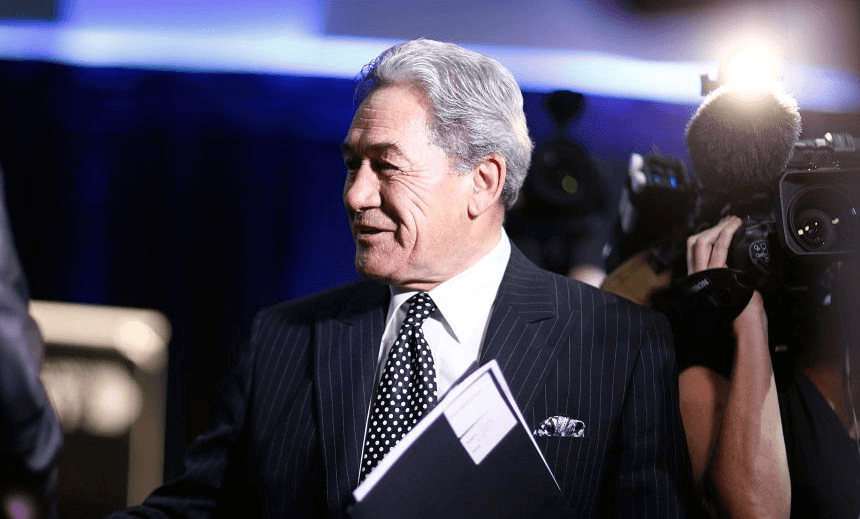Yesterday Massey University’s Claire Robinson argued against this being a change election with reference to prior results. Here the University of Otago’s Andrew Geddis suggests that these endless circular arguments are simply in the eye of the beholder.
Have a look at this picture of Rubin’s vase and see what you see: is it two faces looking at each other; is it a wine goblet? The true answer is that it is both; yet because of how our brains are wired to perceive the world, whichever image you choose to see, you then cannot see the other.
I was reminded of this phenomenon yesterday whilst reading Claire Robinson’s strong argument against understanding the official election result as being one “for change”. It’s not so much that I think she is wrong to say so, but rather that viewing the outcome in this way requires blanking out another, equally plausible narrative.
Before getting to that, however, if (as Claire suggests) anyone in Labour actually believed that special votes might switch the four seats needed to allow the Labour-Green bloc to pull ahead of National-ACT, much less giving Labour the four it required to govern with NZ First’s support alone, then they have no business in politics.
The final shift of two seats from National to Labour and the Greens realistically was all that could be hoped for based on previous voting distributions – although it is worth noting that had fewer than 5000 of National’s voters instead backed Labour, a third seat would have transferred between those two parties. So far from being “disappointing”, the outcome of the special vote count was exactly as expected.
That official result then leaves the opposing blocs quite closely balanced, albeit that National’s 56 seats (or, 57 with ACT’s support) still is larger than the 54 held by Labour and the Greens. New Zealand First’s 9 seats represents the sole decider of who will govern, now that Vernon Small has taken the “Teal Deal” out behind the barn and given it the ending it so richly required.
Those numbers provide us with our agreed facts. There then is no way to interpret them that does not involve some form of observer bias.
Squinted at one way, they look like an endorsement of National’s last nine years of governance. Refocus your eyes and they represent a majority vote in favour of parties who campaigned on a clear platform of change.
Claire’s article makes a strong argument for the former view. However, it only seems fair to note she has some reason for doing so.
In November of 2016, Claire confidently predicted that, based on historical modelling, “National will overcome the ‘third-term blues’ to win another general election.” It’s not the first time that she has used precedent to forecast electoral outcomes. A similar claim made a full year before the 2014 election proved to be quite accurate (as I later had cause to recognise while consuming a healthy dose of humble pie).
Given this prior commitment, it’s not surprising that Claire regards the election result as “a vote for the status quo”. And depending on what NZ First does this week, she may very well turn out to be correct. But there is a counter-narrative that is at least worth considering.
First of all, the last nine years has not just been about National alone. They could not have governed for that time without three other support partners.
Post September 23rd, two of those partners have been ejected from the House entirely, whilst the third has been reduced to spitting distance of becoming an overhang seat. While National may have retained much of its support base, its governing options have been both radically reduced and fundamentally altered.
Indeed, National’s only path back into government has Winston Peters as its gatekeeper. Meaning that the issue is no longer whether the voters think the status quo should prevail, but rather if NZ First wants change to occur.
I honestly don’t know the answer to that question. And I strongly suspect anyone who claims they do is projecting a somewhat unwarranted confidence.
It is true that, as Claire notes, a decision to allow National to govern (whether with active support or by abstention) has the benefit of being a two-party arrangement. I made the same point straight after the election, and repeated it again on Saturday once the official vote count was announced.
But against this is the fact that (apparently) a majority of NZ First’s support base favours a deal that would allow Labour to govern. And remember that all those supporters cast their votes based on a campaign with the tag line “had enough?”.
Then there is the fact that much of NZ First’s policy platform looks easier to mesh with Labour than with National (but perhaps not so much with the Greens?). And the fact that Winston Peters really seems to dislike some individual National Ministers (but was originally a National MP?). And a Labour-Green arrangement is the fresh future (but National has experience and stability in running the country?).
For every reason that you can think of for NZ First wanting to go one way, there seems to be an equally cogent reason for it going the other. And unless we believe that Winston Peters (and NZ First generally) genuinely has no option but to permit National to govern, the ultimate decision as to whether this is a “change” election or a “retention of the status quo” depends entirely on whatever decision those reasons produce this week.
That being so, perhaps the better analogy for our election result is less Rubin’s vase and more Schrodinger’s cat. Until we can observe Winston’s choice, it is simultaneously a change and a not-change election at the same time.

